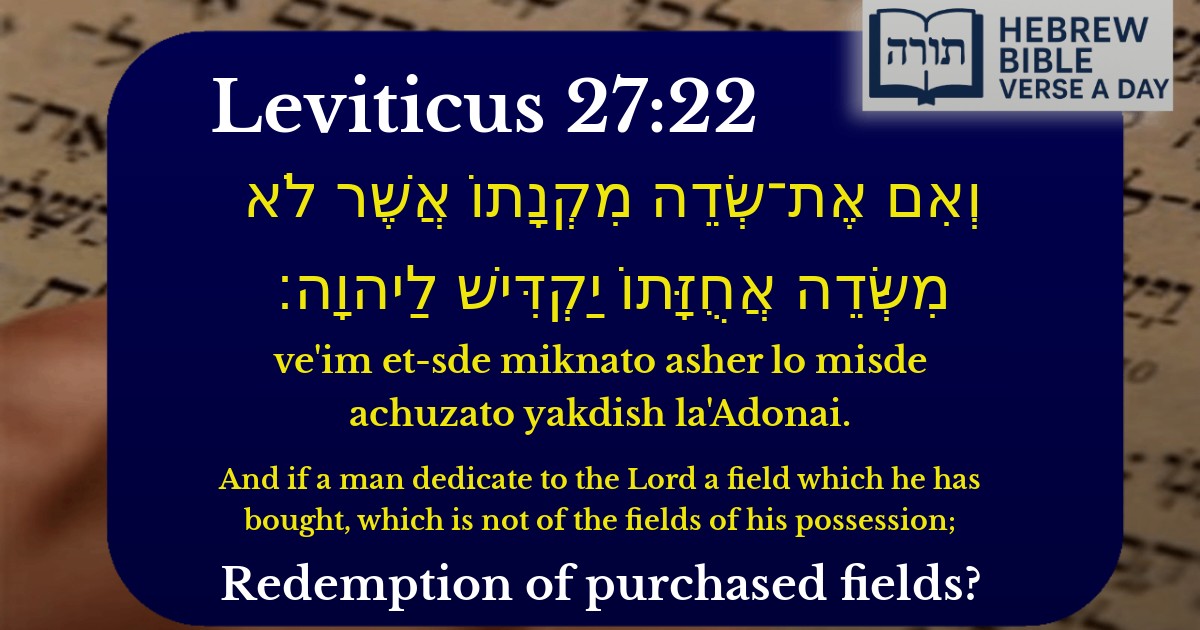Join Our Newsletter To Be Informed When New Videos Are Posted
Join the thousands of fellow Studends who rely on our videos to learn how to read the bible in Hebrew for free!
Hebrew Text
וְאִם אֶת־שְׂדֵה מִקְנָתוֹ אֲשֶׁר לֹא מִשְּׂדֵה אֲחֻזָּתוֹ יַקְדִּישׁ לַיהוָה׃
English Translation
And if a man dedicate to the Lord a field which he has bought, which is not of the fields of his possession;
Transliteration
Ve'im et-sde miknato asher lo misde achuzato yakdish la'Adonai.
Hebrew Leining Text
וְאִם֙ אֶת־שְׂדֵ֣ה מִקְנָת֔וֹ אֲשֶׁ֕ר לֹ֖א מִשְּׂדֵ֣ה אֲחֻזָּת֑וֹ יַקְדִּ֖ישׁ לַֽיהֹוָֽה׃
וְאִם֙ אֶת־שְׂדֵ֣ה מִקְנָת֔וֹ אֲשֶׁ֕ר לֹ֖א מִשְּׂדֵ֣ה אֲחֻזָּת֑וֹ יַקְדִּ֖ישׁ לַֽיהֹוָֽה׃
🎵 Listen to leining
Parasha Commentary
📚 Talmud Citations
This verse is quoted in the Talmud.
📖 Arakhin 29a
The verse is discussed in the context of the laws of dedicating fields to the Temple, specifically regarding fields that are purchased and not ancestral property.


Context in Vayikra (Leviticus)
This verse (Vayikra 27:22) appears in the section discussing the laws of erchin (vows of valuation) and consecrated property. It specifies the unique status of a purchased field—as opposed to an ancestral field—when dedicated to Hashem.
Rashi's Explanation
Rashi clarifies that this refers to a field bought from another Israelite, not part of the ancestral land (nachalah) originally allotted to the tribes. Such a field has different sanctity rules: if consecrated, it does not return to the owner at the Jubilee (Yovel) like ancestral land would. Instead, it remains with the Beis HaMikdash unless redeemed by the owner.
Rambam's Legal Perspective
In Hilchos Arachin VaCharamim (4:19), the Rambam rules that a purchased field's sanctification follows distinct redemption procedures. The owner must pay its full value (per the shekel hakodesh), and if unredeemed, it becomes permanent Temple property—unlike ancestral land, which reverts at Yovel.
Midrashic Insight
The Sifra (Behar 7:1) links this law to the broader principle that land in Eretz Yisrael is fundamentally Hashem's (Vayikra 25:23). Even in transactions, ultimate ownership remains Divine, and consecration reflects this higher claim.
Practical Implications